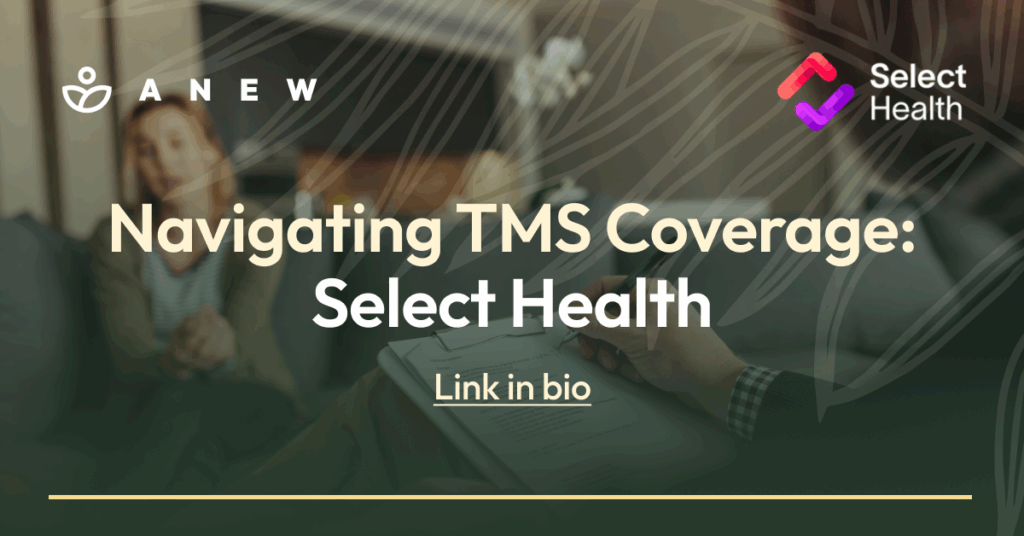Does SelectHealth cover TMS? The short answer is yes – but it depends on your specific plan and meeting certain clinical criteria. We’ll dive into the details below, expanding on what TMS entails, how it works, and exactly what you’ll need to qualify for coverage.
Understanding TMS and Its Uses
What is TMS?
Transcranial Magnetic Stimulation (TMS) is an FDA-approved, non-invasive therapy primarily used for major depressive disorder (MDD), treatment-resistant depression (TRD),and obsessive-compulsive disorder (OCD) . TMS utilizes magnetic pulses delivered through a coil placed on the scalp, stimulating specific regions of the brain associated with mood regulation.
Originally approved by the FDA in 2008 for adults suffering from major depressive disorder who haven’t adequately responded to antidepressant medications, TMS has increasingly become a trusted option in mental health treatment, providing hope to those who have struggled to find relief elsewhere.
How Does TMS Work?
TMS therapy works by using brief magnetic pulses to generate electric currents in targeted areas of the brain, notably the dorsolateral prefrontal cortex, which is often underactive in people with depression. This stimulation helps restore proper brain function and connectivity, promoting symptom relief.
Unlike antidepressant medications, which can take weeks to be effective, TMS therapy typically shows noticeable results within 4-6 weeks, with some patients experiencing improvement even earlier.
TMS sessions are performed in outpatient clinics, usually lasting about 20 to 40 minutes each, administered five days per week for about six weeks. Prior to beginning TMS, a thorough psychiatric evaluation and medical history review ensure it’s the appropriate treatment option for the patient.
Does SelectHealth Cover TMS?
Navigating insurance for mental health treatments like TMS can be complex. If you’re asking, “Does SelectHealth cover TMS?”, the answer is yes — for qualifying major depressive disorder cases under their commercial plans.
Criteria for Coverage
Most SelectHealth commercial plans require all of the following:
- Confirmed Diagnosis of treatment-resistant MDD, documented by a psychiatrist or psychiatric APRN.
- Medication Trials: Evidence of failure of four adequate antidepressant trials drawn from at least two different drug classes within the past 12 months.
- FDA-Cleared Device: Treatment must use an FDA-cleared TMS system (e.g., NeuroStar®) under the labeled protocol.
How to Get Approved for TMS Treatment
- Initial Psychiatric Evaluation: Schedule a face-to-face assessment with a SelectHealth-credentialed psychiatrist, who will document your MDD diagnosis, prior medication history, and treatment-resistance.
- Prior Authorization Submission: Your provider submits clinical notes, depression rating scales, and medication trial records to SelectHealth’s Utilization Management team.
- Verification of Benefits: Confirm your plan tier (Commercial, CHIP, Advantage) and understand your in-network cost-share (copays, coinsurance) and any deductible obligations.
- Select an In-Network Clinic: Ensure the TMS provider is contracted with SelectHealth under your specific plan to avoid surprise out-of-pocket costs.
Be sure to follow all of the above steps, as doing so will increase your chances of obtaining approval for TMS treatment under SelectHealth.

Comparing Coverage: SelectHealth, Medicare, BCBS, and Other Providers
When it comes to covering TMS and other esketamine treatments, the landscape can vary slightly between SelectHealth, Medicare, Blue Cross Blue Shield and other providers. Each has its own criteria and processes for approval, which can affect accessibility for patients with treatment-resistant depression or major depressive disorder.
SelectHealth Coverage Details
SelectHealth covers TMS therapy under commercial plans, provided certain criteria are met:
- Confirmation of treatment-resistant depression.
- Documentation of failed trials with multiple antidepressants.
- TMS administered with FDA-approved equipment following established protocols
Medicaid and Medicare Coverage
Medicaid coverage for TMS is state-dependent, often requiring extensive documentation of diagnosis, previous treatment attempts, and pre-authorization. Each state’s Medicaid program has unique criteria, so reviewing your local guidelines is crucial.
Medicare Part B covers TMS therapy for adults diagnosed with treatment-resistant depression, requiring thorough documentation, including a record of failed medication trials. Medicare typically authorizes a set number of initial treatments, and further authorization requires demonstrating positive patient response.
Blue Cross Blue Shield Coverage Details
Blue Cross Blue Shield coverage for TMS therapy generally requires a confirmed diagnosis of treatment-resistant depression, documented treatment attempts, and prior authorization. Coverage specifics and ease of approval can vary between states and specific BCBS plans. For example, BCBS in states like New York or Utah may have clearer guidelines compared to others, where more stringent documentation might be required.
Other Insurance Providers
- Aetna: Provides coverage upon medical necessity verification, requiring proof of inadequate responses to previous treatments and ensuring TMS is conducted under proper medical supervision.
- Cigna: Requires a confirmed MDD diagnosis, unsuccessful prior treatments, and TMS must be administered in certified healthcare facilities following approved protocols.
- United Healthcare: Covers TMS following detailed diagnostic and treatment criteria, including documented trials of antidepressants, clinical assessment scores, and certification of the administering healthcare provider.
- TRICARE: Covers outpatient rTMS for Major Depressive Disorder in adults 18 or older after failed less-intensive interventions; requires prior authorization under Tricare Prime, Select, and West plans.
- University of Utah Health Plans: Currently does not cover any form of repetitive TMS for behavioral health, classifying it as investigational; MDD treatment may fall under behavioral health carve-outs in PMPM plans.
- DMBA (Deseret Mutual Benefits Administration): Preauthorization required for specialized outpatient procedures; coverage levels vary by plan (e.g., PPO 90 pays 100% after $45 copay, HSA plans cover 60-80% after deductible).
- EMI Health: Requires prior authorization for high-cost procedures; TMS, once approved, is covered under the plan’s medical benefits and subject to in-network cost-sharing per member’s specific plan.

Cost Considerations
While insurance generally covers a significant portion of TMS treatment, patient costs can vary widely based on specific insurance plans. It’s crucial to confirm the exact financial responsibility, including:
- Copays or coinsurance per session.
- Annual deductible amounts.
- Out-of-pocket maximums.
Always verify directly with your insurance representative to understand your specific financial obligations.
Conclusion – Why Choose Anew Therapy
Navigating insurance coverage for TMS therapy doesn’t have to be daunting. Understanding the essential criteria, insurance processes, and comparisons among providers can help streamline your approval and treatment experience.
At Anew Therapy Utah, we:
- Utilize FDA-cleared NeuroStar® TMS systems in a comfortable, welcoming environment
- Coordinate directly with SelectHealth and other insurers to handle prior authorizations
- Provide a dedicated team to guide you through treatment scheduling, insurance questions, and follow-up care
- Offer affordable financing through CareCredit, so cost is never a barrier to receiving the treatment you need
Ready to explore TMS? Visit our TMS services page to learn more, check your coverage, and schedule a consultation. Your journey to relief could begin within days – let Anew Therapy help you take that first step toward lasting wellness.

Searching for the best TMS clinic in Utah? Anew Therapy offers expert care and proven results. Schedule your free evaluation today.

